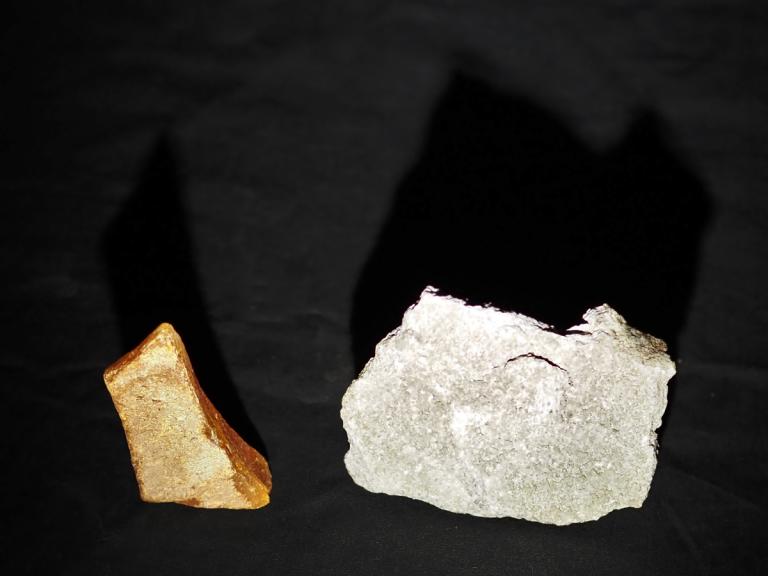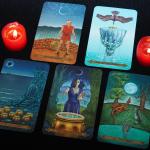When something unusual pops up three times in three days, that’s usually a sign I need to pay close attention to it.
On Saturday I gave a presentation on Druidry at a local metaphysical shop. Before the presentation started, one of the people there asked me what Druids think of demons. I gave a brief answer (they exist and we’re generally better off avoiding them) but I didn’t have time to go into any detail.
Then on Monday, I saw two posts on demons on the Patheos front page. The first was Is Demonic Possession Real? What about Exorcism? from Roger Olson on the Patheos Evangelical channel. Roger is one of the best and most reasonable of Patheos’ Evangelical bloggers. I respect his answer, which can be boiled down to “yes, and I want nothing to do with any of it” (my paraphrase, not a direct quote).
Then on the Progressive Christian channel, Rodney Kennedy wrote Who Are You Calling Demonic? in response to some Trump-followers calling Democrats demons. This is a direct quote, and I’m in strong agreement: “I think MAGA’s inability to correctly identify the demonic has to do with spiritual blindness. When you follow a person whose every word consummates a lie, you are unable to see the demons in your own group.”
When people start talking about demons or about “the devil” my usual response is that I’m too busy with my own Gods, ancestors, and spirits to pay much attention to the spiritual persons I don’t work with and for. But as this occurrence shows, sometimes the topic comes up in our wider culture. And when it does, we need to be able to understand it and respond to it from a Pagan perspective.
There are demons in many cultures
We live in a culture that’s still nominally Christian, and so our ideas and assumptions about demons are heavily influenced by Christianity. But demons are found in many different religions and many different cultures around the world. These religions and cultures have their own terms and definitions, but at a high level demons are spiritual persons who are generally antagonistic toward humans.
In some cultures, demons are part of a good/evil, order/chaos, creation/destruction dichotomy. For others, they represent the parts of nature that are dangerous to humans, from wild animals to diseases. Others say they’re the souls of dead humans who did bad things, or who died in traumatic fashion.
As Pagans, we should not assume that Christian definitions and taxonomies are universally true, even though they may be useful in certain circumstances.
The stories of demons were written by their enemies
History is written by the winners. So are myths. What we know about demons comes from the reports of humans who had interactions with them – and lived to tell their tales, often after significant conflict. These are not exactly objective sources.
At the same time, our ancestors who warned us of the harm demons can do weren’t “primitive” or “uneducated” or “superstitious.” They were humans with the same brains we have, and we ignore their experiences at our peril.
Which is to say: working with demons isn’t “embracing evil.” But it’s not safe either. Go in with your eyes wide open, or not at all.
Demons in the grimoires
The medieval and early modern grimoires are filled with the names of demons and with rituals and sigils to conjure them and to get them to work for you. I’ve done a little of this, but not a lot. Most of the grimoires were written from a Christian perspective and I prefer to work from the perspective of Paganism, polytheism, and animism.
If you’re interested in this work, I strongly suggest you start with Jason Miller’s 2022 book Consorting with Spirits. Jason teaches how to work with spirits from three different perspectives: the Christian, the Pagan, and the Luciferian. The “magical tech” works with any of them. He suggests beginning by earning respect, and then exercising authority in the context of mutual respect. Jumping straight to “I am a mighty sorcerer and you must obey me!” is unlikely to end well.
The risk of possession is greatly overstated
Some people – mainly fundamentalist Christians – live in mortal fear of being possessed by demons. Much of their fear comes from their preachers, who use that fear to keep people from exploring competing religions, or from anything that might look like fun. Preachers who love to perform exorcisms of dubious need and questionable effectiveness to make themselves feel important.
I’ve never been possessed by a demon. But I have experienced divine possession. It’s an amazing, holy thing. But also, it takes a lot of work on my part to relinquish enough control to allow a God – the mightiest of spirits – to take over. For a short time. If it’s that hard to be possessed when I want to be possessed, I’m not the least bit worried about a lesser spirit possessing me against my will. Yes, I have a strong will and sense of self, but I’m hardly unique.
That’s not to say that demonic possession never happens – accounts from around the world say it does. But the odds on you being possessed are very, very low.
The odds on a charismatic preacher convincing true believers that they’re possessed when they aren’t are significantly higher.
It’s more likely that a demon or other malicious spirit will harass someone and cause trouble for them without taking up residence in their body. Cleansing, warding, and shielding usually takes care of that.
Demons as psychological phenomena
It is a enlightenment era assumption that most cases of supposed demonic possession are actually mental illness. There’s some truth to that – maybe a lot of truth. But too often we jump to “mental illness” when people do terrible things when mental illness is at best a contributing factor, not the root cause.
Also, we sometimes speak of demons metaphorically. We talk about trauma as a demon and we call addiction a demon even though we know addiction is an illness and not a moral failing, much less the work of a malevolent spirit. The metaphor communicates the damage these things can do, as well as our difficulty trying to understand them.
Demonizing the Other
As a kid, I saw missionaries come into churches on a regular basis, looking for financial support. More than a few of them went to countries in Africa and South America, and those who did almost always talked about “demonic activity” in such places. Part of that was flat-out racism. Another part was the assumption that any religion and any culture significantly different from the Western Protestant Christianity the missionaries were used to had to be dominated by the devil and his minions.
You see the same thing on a smaller scale in Rodney Kennedy’s post about ultraconservatives calling liberals and Democrats “demons.” They aren’t like us, so they must be evil.
This is dangerous thinking. This is how you go from antisemitism to pogroms to the Holocaust.
Call out people on bad behavior. Call out religions that inspire people to do bad things. But be very, very careful when you start to attribute their actions and motivations to demons. Humans are perfectly capable of great evil all on our own – we need no help from demons.
A modern Pagan view of demons
So, what can we say about demons?
Take Christian lore about demons with the proverbial grain of salt. Mainly, don’t take it literally. But don’t write it off completely – it’s been helpful to some people at some times in some places.
Based on the many stories from around the world, we can say that demons are spiritual persons who are generally antagonistic to humans. Some take pleasure in harming us, while others just want to be left alone to do their own things and react aggressively when bothered. We rarely hear their side of the story – don’t assume they’re evil. Of course, crocodiles aren’t evil, but they’ll still eat you if they get the chance.
It is possible to persuade demons to work for you, if you’re willing to trade something they want, or if you have sufficient power – your own power or power borrowed from spiritual allies – to compel them to do your will. Before embarking on such a project, ask yourself what you’re willing to trade, and be sure you’re really as strong as you like to think you are. Better to bargain in good faith and trade fair value for fair value.
Or just avoid them entirely.
Mainly, don’t be afraid of them. You’re unlikely to encounter them. If you do, you can probably deal with them with basic protection magic. And if you can’t, you can consult an expert.
Just make sure the “expert” you call knows more about demons than book burning fundamentalists.

















